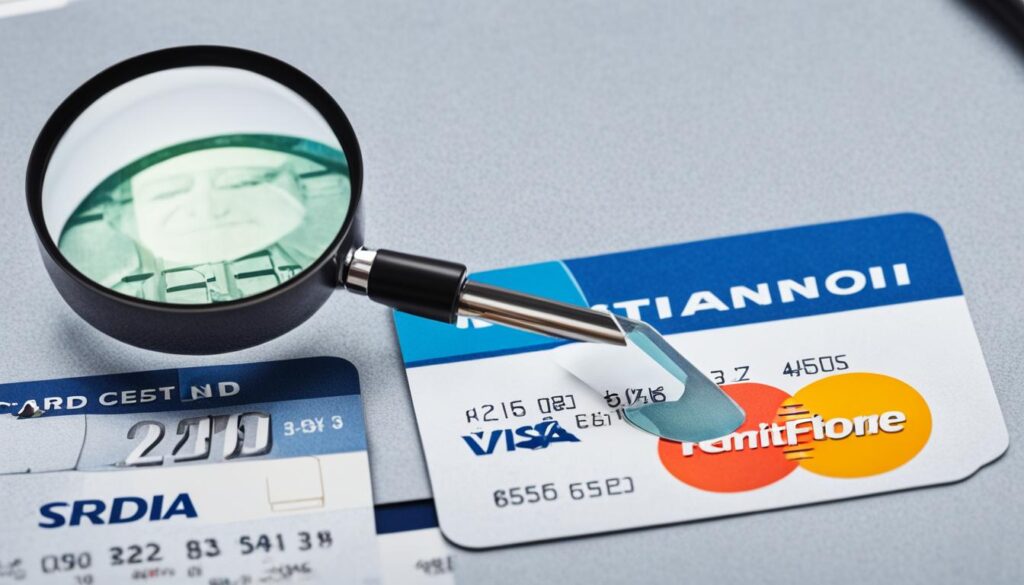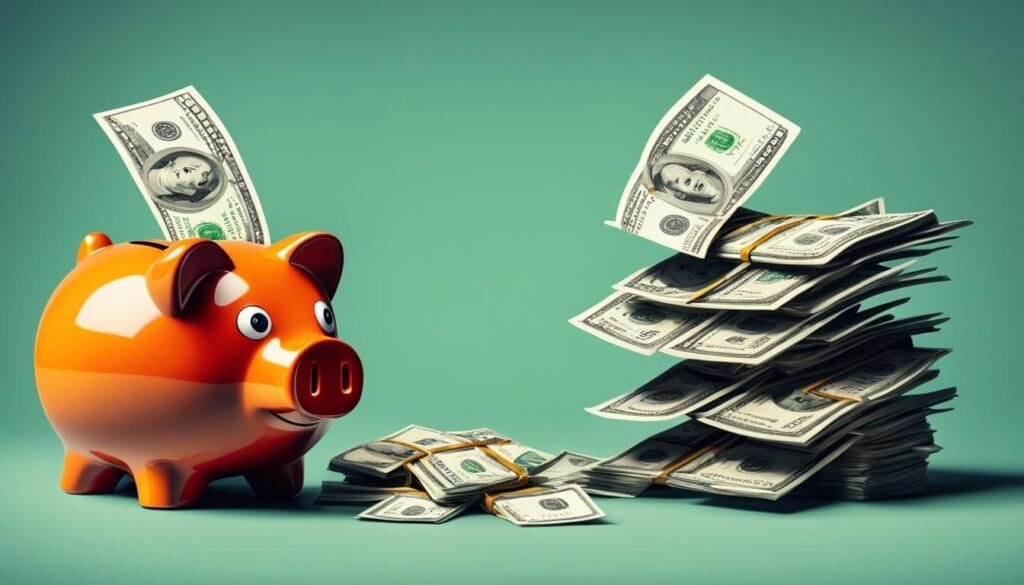Credit card psychology is a captivating field that explores the subconscious factors influencing our spending habits. Understanding the psychological aspects at play behind credit card use can empower individuals to make more informed financial decisions. Experts have identified certain toxic money habits, particularly prevalent among narcissists, which can have a detrimental impact on both personal relationships and finances. By unraveling the secrets of narcissistic behavior and recognizing the dangers of overspending, we can develop healthier credit card habits and protect ourselves from manipulation.
Psychological factors, such as emotional spending and the subconscious impact of credit cards, greatly influence our decision-making when it comes to using credit cards. It’s important to be aware of these influences to avoid falling into the overspending trap and facing financial difficulties. By implementing strategies to resist the temptation of credit card spending, we can exercise restraint and develop better financial habits. Additionally, building immunity to narcissistic manipulation and strengthening our financial resilience play vital roles in achieving a healthier relationship with credit cards.
Key Takeaways:
- Understanding the psychology behind credit card use can help individuals make smarter financial decisions.
- Narcissists often exhibit toxic money habits, such as being secretive about their finances and using money as a tool for manipulation.
- Overspending with credit cards can lead to financial difficulties and debt, influenced by psychological factors like impulsive buying and the allure of rewards.
- Resisting the temptation of credit card spending can involve setting boundaries, considering the long-term consequences, and being mindful of psychological influences.
- Building immunity to narcissistic manipulation involves recognizing manipulative tactics and establishing clear boundaries.
The Secrets of Narcissists and their Toxic Money Habits
Narcissists possess a distinct set of toxic money habits that can profoundly impact their relationships and financial well-being. Understanding these habits can provide valuable insights into the subconscious impact of credit cards and the intricacies of credit card behavior. Let’s explore some of the key habits exhibited by narcissists when it comes to money:
- Secrecy about Finances: Narcissists often keep their financial matters concealed, enabling them to make one-sided money decisions and control their partner’s perception of their financial situation. This behavior can lead to a power imbalance within the relationship and hinder open communication about shared finances.
- Deceptive Generosity: Narcissists frequently display a false sense of generosity, particularly in public settings. They may project an image of being generous with their money, while in reality, they prioritize their own interests and engage in stingy behavior in private.
- Skimping on Essentials: Another toxic money habit characteristic of narcissists is their tendency to prioritize unnecessary spending over basic needs. They may allocate significant amounts of money for personal luxuries and indulgences, neglecting essential expenses like bills, groceries, or healthcare.
- Hypocritical Nature: Narcissists exhibit a hypocritical nature when it comes to financial matters. They may criticize or judge others for their spending habits while engaging in the same behavior themselves. This inconsistent stance highlights their desire to maintain a superior financial status and project an image of financial control.
- Using Money as a Tool for Punishment: Narcissists may utilize money as a means of manipulation and control. They might withhold financial support or use their financial resources as a punishment to exert power over their partners or exploit their vulnerabilities.
The toxic money habits displayed by narcissists can significantly impact their relationships and financial stability. Understanding these behaviors can help individuals identify red flags and take action to protect themselves from the negative consequences.
It is important to remember that not all individuals who exhibit these habits are narcissists, but recognizing these patterns can aid in making informed decisions about money and credit card usage.
Image
The Dangers of Overspending with Credit Cards
Using credit cards can have serious consequences, leading to financial difficulties and debt. The decision-making process when it comes to credit card use is influenced by various psychological factors.
One of the significant psychological factors that contribute to overspending with credit cards is the ease of making purchases. With just a swipe or click, individuals can instantly acquire items without physically handing over cash. This convenience and immediacy can often lead to impulsive buying behaviors, where people make purchases without carefully considering the consequences.
“Credit cards make it easier for consumers to spend more than they can afford.”
The availability of credit and the ease of making purchases with credit cards can promote impulsive buying behaviors. Individuals may be more likely to indulge in unnecessary purchases when there are no immediate financial consequences. This can result in a vicious cycle of accumulating debt and struggling to make monthly payments.
Furthermore, the allure of rewards and benefits associated with credit cards can also influence overspending. Credit card companies often offer attractive rewards programs, cashback incentives, or exclusive perks for cardholders. These rewards can create a sense of entitlement and justify unnecessary purchases. For example, individuals may convince themselves that buying an expensive item is justified because they will earn extra reward points or receive cashback.
“The allure of rewards and benefits can lead individuals to justify unnecessary purchases.”
It’s crucial to remember that these rewards are often designed to encourage spending and increase credit card usage. While they can offer temporary benefits, they may not outweigh the long-term financial consequences of overspending and accumulating debt.
| Psychological Factors Influencing Credit Card Use | Dangers of Overspending |
|---|---|
| Convenience and ease of making purchases | Accumulating debt and financial difficulties |
| Allure of rewards and benefits | Justification of unnecessary purchases |
| Impulsive buying behaviors | Struggling to make monthly payments |
To avoid the dangers of overspending with credit cards, it is crucial to be mindful of the psychological factors at play. By recognizing the temptation to make impulsive purchases and justifying unnecessary expenses, individuals can take proactive steps towards responsible credit card use.
Image:

Ways to Resist the Temptation of Credit Card Spending
Resisting the temptation of credit card spending requires implementing certain strategies that promote responsible financial habits. By being mindful of both credit card spending habits and the psychological factors that influence credit card use, individuals can take control of their finances and avoid falling into the trap of impulsive purchases.
One effective approach to resisting credit card temptation is to discourage self-control and exercise restraint when it comes to money. This can be achieved by setting clear boundaries and creating a budget that aligns with one’s financial goals. By having a predetermined spending limit, individuals can avoid the urge to overspend and make impulsive purchases. Additionally, establishing a habit of regularly reviewing and tracking expenses can provide a visual representation of where money is being allocated, helping individuals stay accountable to their budget.
Recognizing the expenses associated with credit card use is another essential strategy for resisting the temptation of credit card spending. High interest rates and additional fees can quickly accumulate, causing significant financial strain in the long run. By considering the potential long-term consequences of overspending and accumulating credit card debt, individuals can make more informed decisions about their purchases. This heightened awareness can serve as a deterrent to impulsive buying behaviors.
Awareness of the psychological factors influencing credit card use is crucial in developing healthier spending habits. The allure of rewards and benefits associated with credit card usage can often lead individuals to justify unnecessary purchases. By understanding the psychological influence behind these incentives, individuals can be more discerning when evaluating the true value of these rewards.
By implementing these strategies and being mindful of both credit card spending habits and psychological factors, individuals can resist the temptation of credit card spending and develop a more responsible approach to managing their finances.
Building Immunity to Narcissistic Manipulation
Building immunity to narcissistic manipulation is crucial in maintaining healthy financial habits. One way to do this is by not easily giving praise or validation to narcissists. By showing indifference to their attention-seeking behavior, individuals can discourage narcissists from targeting them. It is also important to establish and maintain clear boundaries, which narcissists are less likely to challenge. By recognizing manipulative tactics and trusting one’s instincts, individuals can protect themselves from falling victim to narcissistic manipulation.
Recognizing Manipulative Tactics
Narcissists often employ various tactics to manipulate others, especially when it comes to money. By being aware of these tactics, individuals can better defend themselves against manipulation. Some common manipulative tactics include:
- Gaslighting: Narcissists may distort the truth and make individuals question their own perception of reality.
- Guilt-tripping: They may use guilt as a tool to manipulate others into giving them money or making financial decisions in their favor.
- Playing the victim: Narcissists often act like the victim to gain sympathy and financial support from others.
- Financial control: They may exert control over the finances of their partners or family members, using money to maintain power and control.
Establishing Clear Boundaries
Setting clear boundaries is essential in protecting oneself from narcissistic manipulation. Here are some strategies to establish and maintain boundaries:
- Define your limits: Identify what you are comfortable with in terms of sharing your finances and making financial decisions.
- Communicate clearly: Express your boundaries to the narcissist in a calm and assertive manner.
- Stick to your boundaries: Be firm and consistent in enforcing your boundaries, even if the narcissist tries to push against them.
Trusting Your Instincts
Trusting your instincts can help you avoid falling victim to narcissistic manipulation. If something feels off or manipulative, listen to your gut and take the necessary steps to protect yourself. It may be helpful to seek support from friends, family, or a therapist who can provide an outside perspective and guidance.
“Trust your instincts. Intuition doesn’t lie.” – Oprah Winfrey
By building immunity to narcissistic manipulation, individuals can safeguard their financial well-being and make sound decisions free from undue influence. Recognizing manipulative tactics, establishing clear boundaries, and trusting one’s instincts are key steps in protecting oneself from the negative impact of narcissism on money matters.
Strengthening Financial Resilience
Strengthening financial resilience is essential in navigating the challenges posed by credit card psychology. One way to achieve this is by finding meaning outside of romantic relationships and focusing on personal goals and purpose. By placing emphasis on individual growth, individuals can develop a stronger sense of self and reduce reliance on external validation.
Additionally, developing a secure attachment style through therapy can help individuals become less vulnerable to the influence of narcissists. Therapy provides a safe and supportive environment to explore past experiences and develop healthier relationship patterns. It allows individuals to gain insights into their own behaviors and understand the impact of childhood experiences on their credit card spending habits.
“Recognizing manipulation tactics and observing one’s relationship dynamics from an objective perspective can further strengthen financial resilience.”
By recognizing manipulation tactics used by narcissists, individuals can protect themselves from emotional spending on credit cards. This awareness helps to prevent impulsive purchases driven by external influences and develop a sense of control over credit card behavior. By adopting a more objective perspective, individuals can better understand their own patterns of emotional spending and make conscious choices that align with their long-term financial goals.
To summarize, strengthening financial resilience involves finding personal meaning, developing a secure attachment style, and recognizing manipulation tactics. These strategies empower individuals to resist the temptation of emotional spending on credit cards and make more informed credit card spending habits.

Understanding Credit Utilization and Credit Scores
When it comes to managing credit card use effectively, understanding credit utilization and credit scores is crucial. The credit utilization ratio is a key factor in credit scoring, measuring the amount of debt compared to the total available credit. It is recommended to keep credit utilization below 30% to maintain a good credit score. Failing to do so can have far-reaching consequences, such as higher insurance premiums and difficulties in obtaining loans.
Did you know? A high credit utilization ratio indicates a higher risk of defaulting on payments, which negatively impacts credit scores.
Managing credit utilization involves finding the right balance between using credit responsibly and not maxing out available credit limits. By being mindful of their credit utilization ratio, individuals can make informed decisions about their credit card use, ensuring they stay within a healthy range and maintain a strong credit score.
Keeping track of credit scores regularly is also essential in understanding one’s creditworthiness. A credit score is a three-digit number that indicates an individual’s creditworthiness based on their credit history. Lenders use this score to assess the likelihood of a borrower repaying their debts. A higher credit score opens doors to better financial opportunities, such as lower interest rates and higher credit limits.
Fun Fact: FICO and VantageScore are two commonly used credit scoring models that range from 300 to 850. The higher the score, the better the creditworthiness.

Regularly monitoring credit scores allows individuals to identify any inaccuracies or fraudulent activities that may need to be addressed. There are various credit monitoring services available that provide real-time updates and alerts regarding any changes to credit scores.
By understanding the impact of credit utilization and credit scores, individuals can make informed decisions about their credit card use, effectively managing their finances and working towards building a healthier financial future.
What are the common psychological factors that influence credit card spending habits?
Many credit card psychology experts hate the impulsive nature of consumer spending. Factors like emotional triggers, social pressures, and perceived scarcity can influence individuals to overspend. Additionally, the lure of rewards and discounts can entice people to make unnecessary purchases, driving up their credit card bills.
Conclusion
Credit card psychology plays a significant role in shaping our spending habits and financial decision-making. The subconscious factors that drive credit card use have a profound impact on our financial well-being. It is crucial to understand the psychology behind credit cards and be aware of the toxic money habits associated with narcissistic behavior.
By recognizing and resisting the temptation to overspend, individuals can take control of their credit card spending habits. Setting clear boundaries and exercising self-control can help in cultivating healthier credit card behaviors. Additionally, building immunity to narcissistic manipulation is essential in maintaining healthy financial habits and protecting oneself from toxic relationships.
By learning from the subconscious impact of credit cards, individuals can make smarter choices with their finances. Understanding the psychological factors that influence credit card use empowers individuals to navigate the pitfalls of impulsive buying behaviors and unnecessary spending. With mindfulness and awareness, it is possible to develop a healthier relationship with credit cards and improve overall financial well-being.
FAQ
What is credit card psychology?
Credit card psychology refers to the study of the subconscious factors that influence spending habits and decision-making when it comes to credit card use.
How does credit card psychology affect our spending habits?
Credit card psychology can lead individuals to overspend and make impulsive purchases. It can also influence the way we perceive and make decisions about credit card rewards and benefits.
What are some toxic money habits associated with narcissistic behavior?
Narcissists may exhibit toxic money habits such as being secretive about their finances, being hypocritical in their generosity, skimping on essentials, and using money as a tool for punishment.
How can I resist the temptation of credit card spending?
You can resist the temptation of credit card spending by setting clear boundaries, sticking to a budget, and considering the long-term financial consequences of overspending.
How can I build immunity to narcissistic manipulation?
Building immunity to narcissistic manipulation involves not easily giving praise or validation to narcissists, establishing and maintaining clear boundaries, and recognizing manipulative tactics.
How can I strengthen my financial resilience?
Strengthening financial resilience involves finding meaning outside of romantic relationships, focusing on personal goals and purpose, and developing a secure attachment style through therapy.
Why is understanding credit utilization and credit scores important?
Understanding credit utilization and credit scores is crucial for managing credit card use effectively. Credit utilization is a factor in credit scoring, and a poor credit score can have negative consequences, such as higher insurance premiums and difficulties in obtaining loans.
Source Links
- https://www.investopedia.com/articles/younginvestors/08/purchase-financing.asp
- https://www.cnbc.com/2022/04/14/narcissists-share-these-5-toxic-money-habits-that-are-often-ignored-says-psychologist.html
- https://www.usatoday.com/story/life/health-wellness/2023/09/26/narcissists-hate-these-traits-use-them-to-build-narcissism-immunity/70964942007/

